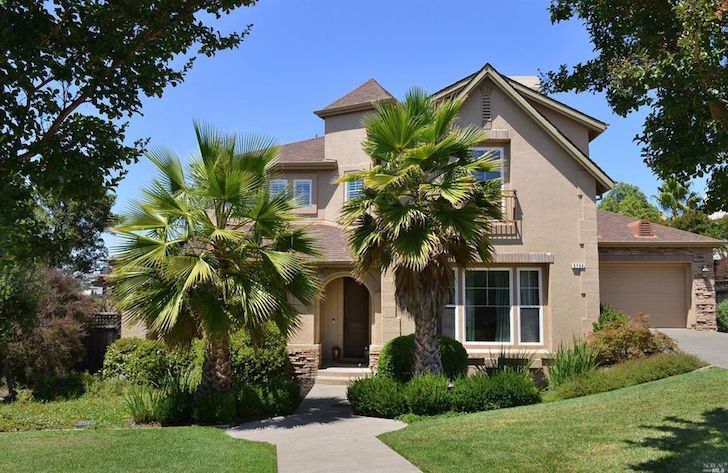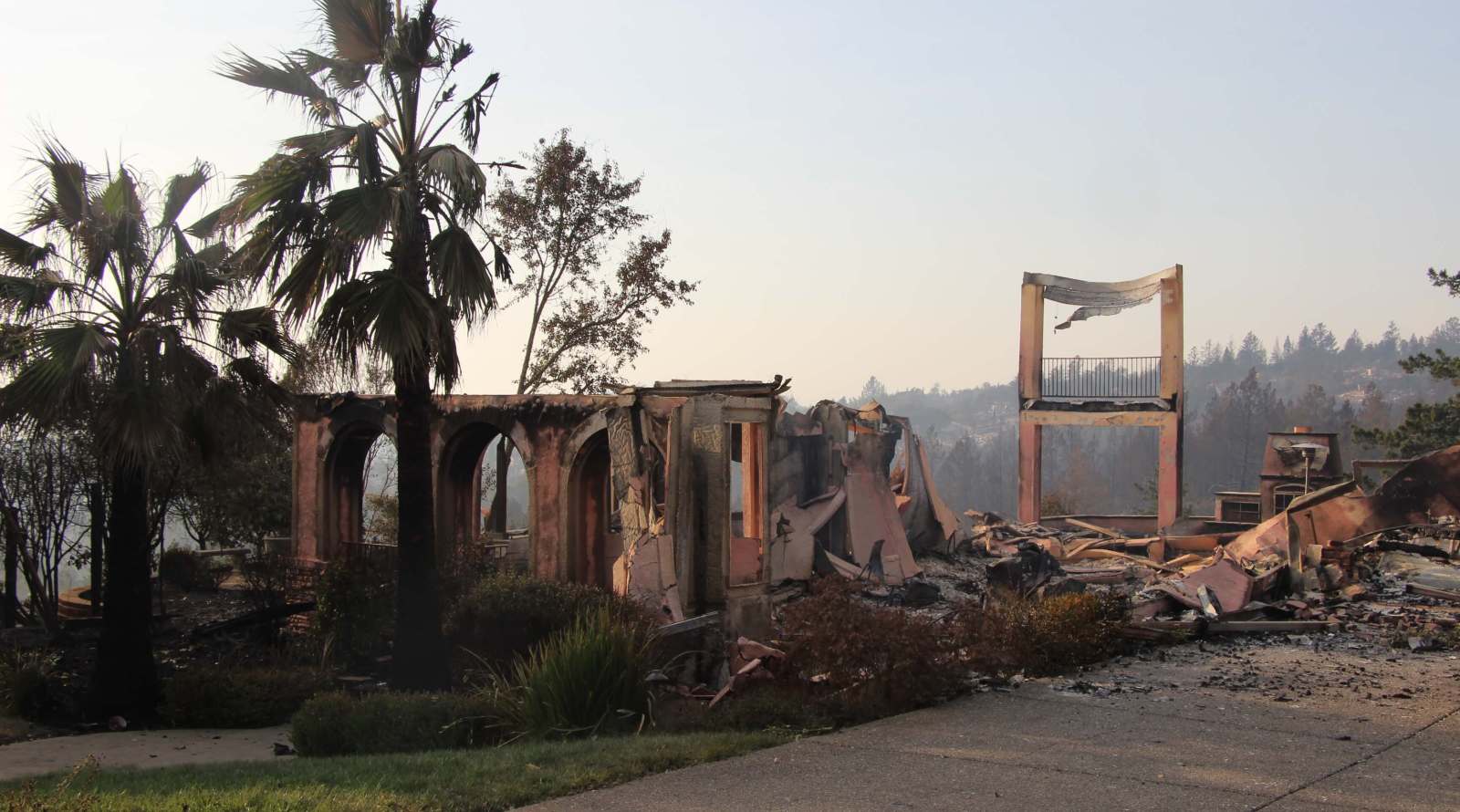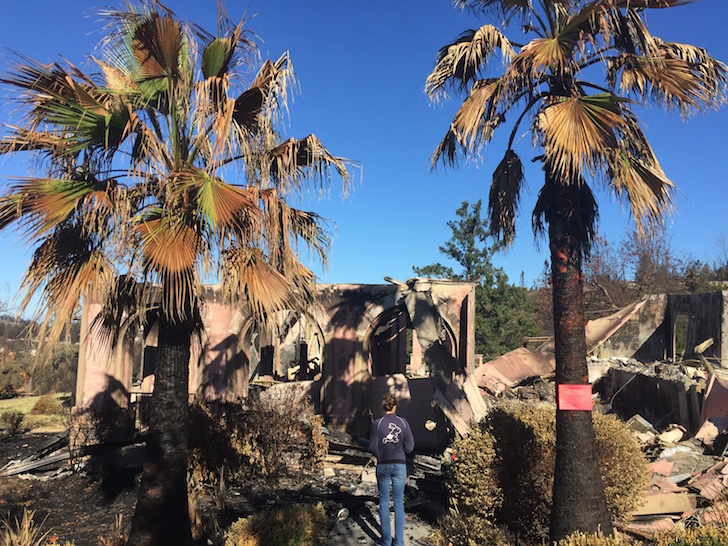Sam asked me to write this post after we lost our home overnight to the Tubb’s Fire in Northern California. We were living a good doctor’s life. A $1.2 million dollar home with a killer sunset view. Life was good, but with my mortgage and student debt I was still quite stressed. The kind that affected me not only internally, but also externally. Affecting both work and relationship with my wife.
Crazy to think that stress and a mortgage can be that powerful, but it was. In fact, I would walk around my home and think about how we had about 1,000 square foot of home more than we needed. It was 3,300 square foot and I determined that 2,000 to 2,500 square foot were a much better fit for us.
But here we sat, 11 months after buying a big home without many financially reasonable options. Then overnight… POOF! It all went up in a flash. We were lucky. Someone knocked on our door at 2 am waking us up. We left with our lives and health, although not much more. Others were not as fortunate and I have seen and felt the impact of those losses in our community. So I write this post knowing how lucky we are. And I am thankful for that.
Interesting points from EJ’s guest post:
- Why being a homeowner may be better than being a renter when disaster strikes
- How home insurance can make you much wealthier
- Know exactly what is covered under your home insurance plan
- Itemize everything in a spreadsheet and a picture catalog
- It may be better to have a complete loss rather than partial damage
Breaking Down A Home Insurance Policy

Our home before the fire
Here’s a home insurance primer on what is important when purchasing a policy. We lost our home, but by being well insured we are covered for not only our possessions and rebuilding, but also for our rental.
After the fires, both home prices (for sale) and rental prices sky rocketed. Classic market supply and demand with a steroid boost of large amounts of insurance money. So not really classic market supply and demand.
That is why Loss of Use Coverage is so important and the first thing we talk about today.
Coverage D: Loss of use and rental
Renters Get Squeezed
In the land of fire and mass chaos, owning is way better than renting (seems counterintuitive, but true). I talked to many people who are renters who have been evicted since the fire. The landlords asked their tenants to leave so that either the landlord or one of their family/friends who lost a home can move in.
This puts the tenants in a bad position because now they are stuck in a town with a housing shortage and now a high price point. They have no choice, either pay more for a similar rental in town or move further out of town. Plus, unlike those who are insured and lost their home, tenants being evicted have no insurance to help them through this. Lose lose.
Many Owners With Insurance Came Out Fine
For owners it is better, but it is only as good as the home owners insurance purchased. I am well insured. My insurance pays for my rental up to two years because the Tubb’s Fire was a Federally declared disaster. If it was just a run of the mill house fire, I would still be covered for 1 year. There is no monetary limit to my rental. Insurance covers an equivalent rental to my home.
So I was able to get a nice rental and not worry about the monthly rent. I will potentially be living in my rental until October 2019. While insurance is paying a lot for my rental, it still is not as much as one friend who has insurance paying $34K a month…yup, $34,000 a month. On the other end is one of my friends, who has a maximum cap of $14,000 for her rental. That means that her insurance will only pay a total of $14,000 for the entire 2 years. Ouch.
First lesson of insurance – make sure you are well insured for not only dwelling and personal property, but also loss of use. This will make your housing situation much better after the loss of your home. Clarify how much coverage you have.
What Type Of Home Insurance To Get?
We have determined that being a owner versus a renter at the time of a disaster likely puts you in a better financial situation with insurance, but what insurance should home owners (and renters to some extent) obtain?
I personally am insured by a large, reputable insurance company who is always on your side. Thus far they have gone by the books and been quite helpful. In fact, by the end of this process I will likely own my land out right, have no mortgage, and have increased my net worth by about $600,000. Granted, I have to replace all of my possessions but that can be done deliberately and slowly. Oh, but I don’t own a home anymore.
But still, a massive increase in net worth is quite the silver lining from this tragedy. Plus all the stress from owning a massive house with a massive mortgage is now gone.
Onto the insurance policy
Insurance coverage is broken down into various coverages.
- Dwelling: Coverage A: Dwelling
- Other structures: Coverage B
- Personal property: Coverage C
- Loss of use: Coverage D
- Personal liability: Coverage E
- Medical pay each person: Coverage F
The limits for these items are visible on the insurance policy declaration page.
These are each important, but Coverage A is the most important.
Coverage A: Dwelling
This is the most important part of the insurance coverage. Coverage A dictates how much the insurance company pays for rebuilding a home. By law, if I rebuild they have to give me at least my Dwelling maximum to rebuild.
Extensions
There are also extensions to this coverage. For instance, I had a 125% coverage extension. This means that they will pay an additional 25% of my maximum if I rebuild. This is an additional $200k for me to rebuild. I even realized after the fact that I could have purchased a “guaranteed replacement cost extension”.
If I had purchased a guaranteed replacement cost extension, then there would be no question about rebuilding as insurance would cover it all. There are 3 companies I know of that have guaranteed replacement cost: Chubb’s, Nationwide, and AIG. If insured with one of these insurers, it may be worth switching to guaranteed replacement cost.
The payment
I thought that insurance will pay out all 100% right off the bat, but unfortunately that is not the case. The insurance company will come up with their own build estimate and from that depreciate the cost of things such as paint, roofs, flooring, etc.
It is not as bad as it sounds. For instance, in my case they depreciated about 1.5% of the home. Once I rebuild, they will pay the full amount.
Also remember that this initial payout is a starting/negotiation point. Right now I have received one big check but am coming back to the insurance company with my builders estimates which are higher than what the insurance company estimated. Time to negotiate!
Coverage A (i.e. dwelling) is the most important part of the insurance coverage. This needs to be enough to rebuild an equivalent home and it is up to you to make sure it is adequate. Generally, increasing the limit leads to only a small increase in the overall annual policy premium.
Another important part of Coverage A is to be insured for “Replacement Cost.” Some insurances offer “Actual Cash Value.” Actual cash value only pays the depreciated cost of the home, meaning the insurance company will only pay for a 20 year old roof and not the cost of a new roof. The difference in reconstruction costs will be covered by out of the owner’s pocket. Not so good if you ask me.
With a “replacement cost”policy, the insurance company may depreciate the home for the initial payout, but will pay that actual replacement cost once the item is built or purchased. This can lead to thousands of dollars when rebuilding.
Coverage B: Other Structures
Another reason the price point of Coverage A is important is because all of other Coverage limits are set by the Coverage A limit.
For instance, I am covered for Other Structures via Coverage B. This includes patios, external fireplaces, fences, and the outdoor kitchen. The maximum insurance will pay me for Other Structures is 10% of my Coverage A. So if I have a $1,000,000 Coverage A limit, I get $100,000 for Other Structures. If my Coverage A limit is $500,000, then I only get $50,000 for Coverage B.
Coverage C: Personal Property
Coverage C or Personal Property coverage is the amount given for all of the items lost. T-shirts, speakers, kitchen appliances…all that stuff we accumulate over a life time. Another way to think of it is that if I took my home and turned it upside down, anything that falls out is paid for by Coverage C.
Getting the insurance company to pay Coverage C can be a bit painful. While they paid a portion of the money up front, I. Had to itemize everything in my home to receive full payment. From underwear to Q-tips. Rugs, couches, and stuffed animals. We spent approximately 75 to 100 hours to itemize every single item.
This was probably the most painful part of the process. We had lost our home and now had to revisit each item again for the insurance company. This was accompanied by a 3 hour recorded interview. Brutal. Please take pictures and itemize all your belongings in a spreadsheet before you need to.
The insurance company will take the list and depreciate it based on age and condition. They will pay out the depreciated cost. Again make sure you are insured for “Replacement Cost” and not “Actual Cash Value”. If you have “Replacement cost” coverage you can submit receipts as you buy items for the insurance company to pay the difference.
Side note, to be able to claim casualty losses in my 2017 taxes, I had to itemize. For the IRS I can deduct the difference between my depreciated value of items and what insurance paid me for these items. Unfortunately with the 2018 tax overhaul I believe this deduction goes away in the future.
Once again, Coverage A (Dwelling) limit dictates the Coverage C limit. For us it was 60% of our Coverage A limit and I think that is fairly standard.
Other coverages
There are also other coverages that come with good insurance. We had coverage for Debris Removal (10% of Coverage A), Landscaping (5% of Coverage A), and Building Code Upgrade (20% of Coverage A).
There is also coverage for Personal Liability (Coverage E) and Medical Pay for Each Person (Coverage F), and these limits can be adjusted as needed.
Deductible Cost
I am actually surprised as to how cheap good insurance is. My insurance cost approximately $1,300 annually with a $1,500 deductible. After this experience I would happily pay $2,000 annually for a higher coverage amount. Nothing is worse then being underinsured after loosing a home. Insurance has by far been the best return on investment I have ever made.
Fire coverage?
Finally it is worth noting that I did not have additional insurance. I had my regular old home insurance and it covered all of the loss. This is not like an earthquake or flood that needs an additionally purchased insurance policy.
My policy covered the fire whether it was a natural disaster or a house fire. Some of the additional protections I received were due to this being a Federally declared disaster and living in a consumer protection state like California. But no, I did not need fire insurance.
This is good, because I would never have thought to ask separately for it. In fact, when I went to bed at 1 AM I saw a red glow over the hill and did not even realize it was a fire.
If there is going to be a fire though, in many ways it is best to have a complete loss like we did. Total destruction so that the insurance company can not argue about what is salvageable.
My neighbor was not so lucky. His home is standing between 2 burnt homes. He had a lot of smoke damage and is house is not habitable currently. He is fighting tooth and nail with the insurance company about his coverage. The insurance company is arguing everything should be cleaned. He has two young kids and is arguing that the home needs to be stripped to the studs.
It is brutal to hear his stories of the back and forth discussions he is having. Not a fight I want to have. He did loose everything, but because his home is still standing receives much less support. I am moving forward while he is still arguing with insurance.


Our home after the fire
Home Insurance Is A Life Saver
It pays to be well insured. I will not claim I knew much about property insurance when I bought my home. In fact, my insurance broker set this policy up for me and has been working with me throughout the claims process. I never even read the entire policy before this. I was by no means an expert, but now have a lot of first hand experience.
This is what I recommend:
- Call the insurance company and ask for a copy of the full policy. This document should be 50 to 70 pages long.
- Make sure to have an adequate Coverage A (Dwelling) limit. This is the coverage that will dictate all of the other coverages. It should be high enough to cover rebuilding a equivalent home.
- Purchase “Replacement Cost” insurance and not “Actual Cash Value” for both Coverage A (Dwelling) and Coverage C (Personal Property).
- Consider an extension for the Coverage A limit. My extension was for 125%, but other’s have 150%, 175%, or even guaranteed replacement cost. It is worth the small increase in annual cost if ever needed.
- Jump through the hoops that the insurance company lays out. I am impressed by my insurance company thus far. As long as I am doing what they ask, they have been quick and reasonable with payments.
There you have it. One man’s experience with insurance after a major fire.
Sam’s note: Hopefully everyone calls their respective home insurance companies this week and asks what their coverage entails. Although it’s terrible to lose a home to a natural disaster, what a silver lining to be $600,000 wealthier thanks to a mandatory home insurance policy that only cost $1,500 a year in premiums. Further, EJ was in his house for less than a year, so the sentimental attachment wasn’t as great compared to someone who had owned their home for 20 years. His story about the night the fire came is a gripping read that will spur you into action.
A natural disaster destroying my home was always in the back of my mind. Only after I sold my rental house in 2017 did I feel a sense of relief that I was able to get out unscathed since my rental house was in the Marina, an area prone to liquefaction during a large earthquake. It’s very interesting how our minds insulate us from potential disaster risk by making us forget.
Related: Reinvestment Ideas After A Big Home Insurance Payout
The post What’s In A Home Insurance Policy: Know The Details Before Your House Burns Down appeared first on Financial Samurai.
from Financial Samurai https://www.financialsamurai.com/what-is-in-a-home-insurance-policy/
No comments:
Post a Comment